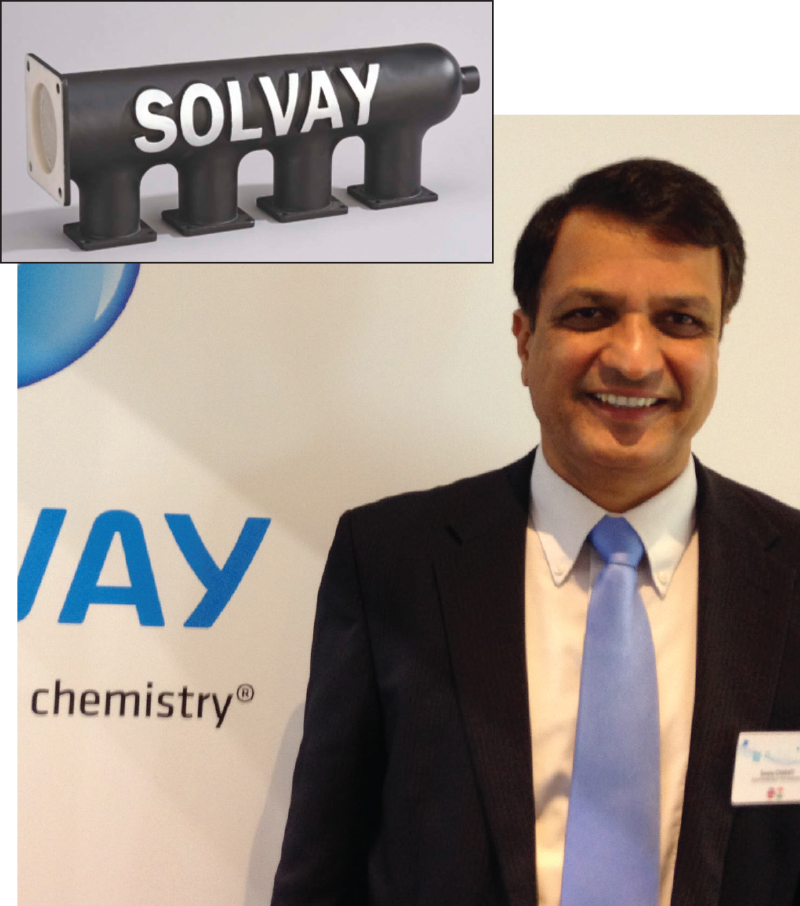Solvay Launches Patented Recycling Process, New ‘Smart Molecule’
Solvay Launches Patented Recycling Process, New ‘Smart Molecule’
Solvay Launches Patented Recycling Process, New ‘Smart Molecule’

Solvay used predictive simulation software to optimize the design of this 3D-printed plenum chamber (top) for the Polimotor 2 all-plastic engine, according to Sanjay Charati (below), R&T Director for Solvay Engineering Plastics. Photos courtesy of Solvay
Solvay, a global supplier of polyamide-based performance materials, launched at K 2016 a nylon material made from post-industrial or end-of-life technical textiles, such as automotive airbags. This involves using a patented process for separating the silicone from the textiles.
Called Technyl® 4earth®, the resulting material is being used to produce 100% recycled parts and delivers performance equal to that of prime quality engineering plastics, Sanjay Charati, research and technology director for Solvay Engineering Plastics, said in an Oct. 25 interview at the show. The firm is producing the material on a new line in Gorzow, Poland, that it started up in late summer.
“Technyl 4earth significantly reduces the environmental impact of polyamide parts to a level that has never been reached before,” said Richard Bourdon, Move 4earth® Project Director. “Solvay’s initial cradle-to-gate assessment shows outstanding results — carbon footprint reduced by a quarter; consumption of non-renewable resources divided by two; and water use decreased by over two-thirds compared to traditional compounds.” The firm is taking post-industrial airbags from two suppliers — Takata and Autoliv — and applying a chemistry process that separates the silicone from the PA and then recompounds that nylon into Technyl 4earth. It sells the recycled silicone separately.
About 35% of glass fiber reinforcement is then added to the nylon compound, and the material is being used to make automotive parts such as oil filters and other under-hood components. “We also are looking at using in in other applications, such as in electrical and electronics, and in consumer and industrial goods, said Charati.
Solvay Engineering Plastics also showcased at K a new product called Technyl® REDx, a heat performance polyamide 6.6 (PA66) that integrates a patented “smart molecule” self-strengthening technology without affecting its structure. This technology remains inactive during the injection molding of car parts, leaving the material behaving like a high-flow PA66. During the vehicle’s use, the elevated temperatures activate the smart technology, leading to rapid crosslinking that boosts the mechanical properties far beyond their initial values.
Technyl® REDx can be processed at energy-saving mold temperatures below 100°C, allowing simple and cost-efficient manufacturing. Ageing tests over 3,000 hours at 220°C demonstrate very high retention property as well as tensile property gain of more than 50%, without degradation of elongation at break. This makes it ideal for applications such as charge air coolers used in downsized and turbocharged automotive engines. Technyl REDx also eliminates the need for heat shields that may be required when using conventional materials, Solvay noted.
Solvay also said it has contributed to development of a 3D-printed part for the Polimotor 2 all-plastic engine, designed and developed by industry pioneer Matti Holtzberg. For the first time, Solvay applied its predictive simulation software called MMI Technyl® Design to a functional 3D printed automotive part in Sinterline®. The part is a plenum chamber, 3D printed by selective laser sintering using Solvay’s Sinterline Technyl polyamide 6 powder grade reinforced with a 40% loading of glass beads. The predictive performance simulations showed the plenum’s original design could be up to 30% lighter than originally thought possible.
Finally, Solvay also announced it is building a new Technyl polyamide compounding unit in San Luis Potosí, Mexico, with initial annual capacity of 10KT. This new facility is expected to become operational in the third quarter of 2017 to serve the region’s and America’s growing automotive and consumer goods markets. www.solvay.com